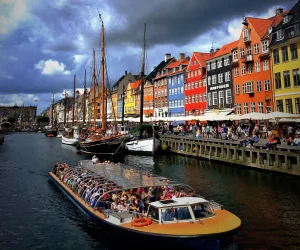‘Shell shocked’ sector sounds alarm on Denmark’s gambling crackdown

New measures in Denmark spark warnings of rising black-market play. Is Denmark losing its crown as the blueprint for pragmatic gambling regulation and high channelisation?
Denmark’s gambling sector is grappling with a series of stringent new regulations that have sent shockwaves through the industry. The government’s recent measures, known as Spilpakken 1, include a whistle-to-whistle ban on betting advertising during live sports, tighter controls on outdoor promotions and restrictions on FTP (free-to-play) bonuses, and have raised serious concerns among operators and industry leaders alike.
At the heart of the debate is Morten Rønde, director of the Danish trade body Spillebranchen and managing partner at Nordic Legal. Speaking to iGB on the immediate impact of the changes, Rønde did not mince his words.
“I am shell shocked to say the least,” he says, capturing the uncertainty and frustration spreading through the sector.
Morten Ronde is concerned about the impact Denmark’s gambling ad restrictions will have
For more than a decade Denmark has been viewed as a model for balanced gambling regulation – strict enough to protect consumers yet flexible enough to sustain a competitive licensed market. That balance, according to Rønde, has been the key to its success.
Regulator’s relationship with the sector
In August, Denmark achieved gambling revenue of DKK 714 million – both a year-on-year and month-on-month increase. Sports betting and iGaming markets posted double-digit growth compared to the same month last year.
“I think the key is that Denmark has struck a balance where you have strict consumer protection and kind of strict, but still pragmatic rules that are possible to comply with for the operators,” Rønde says. The model, he added, maintained a structure where the regulator has been working “in a very open-minded way”.
This dialogue-based relationship between the regulator and licensees – praised in a recent comparative report between Sweden and Denmark, ordered by the Swedish trade body BOS – has long been a cornerstone of Denmark’s success.
Rønde insists the Danish Gambling Authority operates as “the glue in the system”, maintaining trust through direct, transparent communication. “Each operator has two contact persons assigned,” he adds, “a legal contact and a technical contact. So that creates a more personal approach in dialogue with the regulator.”
A turning point for Denmark’s gambling model
But that finely tuned balance has come under strain. The government’s new gambling agreement marks a decisive shift. Minister for Taxation, Ane Halsboe-Jørgensen of the Social Democrats, said it marked the beginning of a reckoning with a gambling industry “that has, for far too long, taken up too much space”.
She said the new measures were to prevent entertainment “from turning into addiction. It requires both responsible operators, stronger regulations and a sustained political effort,” she added.
The government claimed nearly 500,000 Danish adults experienced some extent of gambling problem in 2021 – a figure that has doubled since 2016 – with almost 30,000 experiencing serious gambling problems. Twenty-five thousand Danish children and young people have experienced some degree of gambling harm, according to government data.
“I’m really pleased that we’ve reached a broad agreement that, above all, ensures we can now protect our children and young people much better from advertising for gaming and gambling,” Jan E Jørgensen of the Liberal Party, Venstre, said.
Denmark gambling addiction debate intensified
As public debate around gambling addiction intensifies in Denmark – fuelled by high-profile media stories about widespread gambling addiction among younger men and political pressure – Rønde argues that the measures being implemented are not evidence-based.
“There’s been a rise in gambling addiction,” he acknowledges, “but based on a study that is now three years old and had quite inconclusive findings.” The government, he said, is acting largely because “people are just sick of all the gambling adverts, which we agree with – there are too many of them. They are overexposed in the market.”
Rønde is certain the arguments put forward in the political decision-making process were not supported by meaningful evidence. “In all the proposals that are made, there’s no link to any evidence that this is something that will help gambling addiction. And I am pretty sure that it won’t,” he says.
In his view, the only sustainable path forward is to manage the balance between consumer protection and an attractive regulated offer. “Advertising in Danish media is the only advantage that a licensed operator has. Because otherwise it’s just restrictions and taxation. When you are [no longer] allowed to advertise, you lose that competitive advantage,” Rønde explains.
If those advantages continue to erode, he warns: “there’s nothing left other than the branding you can put on your website that says you’re regulated by the Danish authorities.” Outlining the broader risks, he insists restricting the legal market too heavily will tip the balance.
“And it becomes unviable for the operators, but also for the consumers in Denmark. That leads to leakage in the market and consumers going to the black market. And again, in turn, it would lead to more addiction and more gamblers who get in trouble.”
Total ad ban threat and the risk of market leakage
The new rules, agreed by a broad coalition of political parties, will prohibit betting advertising during live sports broadcasts, restrict outdoor advertising within 200 metres of schools and impose new limitations on bonuses. This could indicate the end of outdoor advertising in Denmark’s major cities in Denmark.
Still, Rønde warns the outcome could have been worse: “It looked worse at one point; a complete advert ban was discussed, but it’s still not great where we’ve landed.” The political appetite for stricter measures remains strong. “There are several political parties in Denmark who are in favour of a full advertisement ban,” he notes.
“What happens if you do impose a ban? Those countries who have tried like Italy and now the Netherlands have seen an explosion in illegal gambling offerings.” He points out the Italian government is now rolling back part of its advertising ban because it was creating too many illegal gambling offers for Italian players.
Denmark could follow the same path – undermining its once-enviable rate of channelisation. “It’s impossible to block operators from the market,” he says of illegal offerings. Black market presence in the market is heightened by a lack of popular products like crash games and virtual betting, as well as various casino games that are banned.
H2 Gambling Capital data shows Denmark’s channelisation rate has fallen to 72%, the same as Sweden. It was historically among the highest in Europe, sitting at around 90% in 2022. Rønde attributes much of the decline to player interest in the aforementioned banned verticals.
Mounting economic consequences
In terms of economic consequences for the sector, Rønde can’t put a figure on it, but insists the sum of the 20 or more new measures will have a big impact. The trade body is considering what these changes will mean for the industry. Most concerning is the likelihood that operators will exit the market in response. “It will severely impact the market and the whole business of being in Denmark,” he laments.
TV2, the biggest commercial TV channel in Denmark, which holds the licence to show matches in the Danish football Superliga, said it expects revenue to drop due to the gambling ad ban – potentially up to €12 million euros per year. “It should be no secret that the regulation comes with significant financial consequences,” TV2’s commercial director, Stig Møller Christensen, said of the impact. Previous government calculations pointed towards a loss in tax revenue in the hundreds of millions in Danish Kroner for the state.
Denmark was the industry’s ‘beacon of light’
In neighbouring Sweden, gambling trade body BOS has been watching Denmark’s developments closely. Gustaf Hoffstedt, BOS’ secretary general, voiced concerns that the new Danish direction could undermine a system long seen as a model for Europe.
“It concerns me,” he says, “because Denmark, together with the United Kingdom, have been the two beacons of light in Europe when it comes to safeguarding the licensing market.” According to Hoffstedt, H2’s revised estimate of 72% channelisation for Denmark is “totally dissatisfactory”.
Like Rønde, he warns against measures that risk driving consumers toward unlicensed gambling: “Denmark should pay more attention to how to create an attractive legal licensed market than to implement measures that will scare away more consumers. After all, that’s the number one consumer protection measure that you can take.”
Hoffstedt cautions that Denmark’s reputation as a regulatory role model is now in question. “Denmark has at least up to this moment been possibly the best example in Europe,” he notes. “Yes, I’m afraid it will change – that Denmark is also choosing a path that in the long run may lead to them crawling in the mud, just as so many other European jurisdictions.”
The message is clear: tightening regulations without maintaining a viable, competitive legal market risks undoing years of progress in consumer protection and channelisation.
As Denmark’s gambling restrictions move toward implementation in January 2027, time will tell whether one of Europe’s most admired regulatory systems can preserve its balance – or whether it will become, as Rønde fears, another example of good intentions gone awry.





